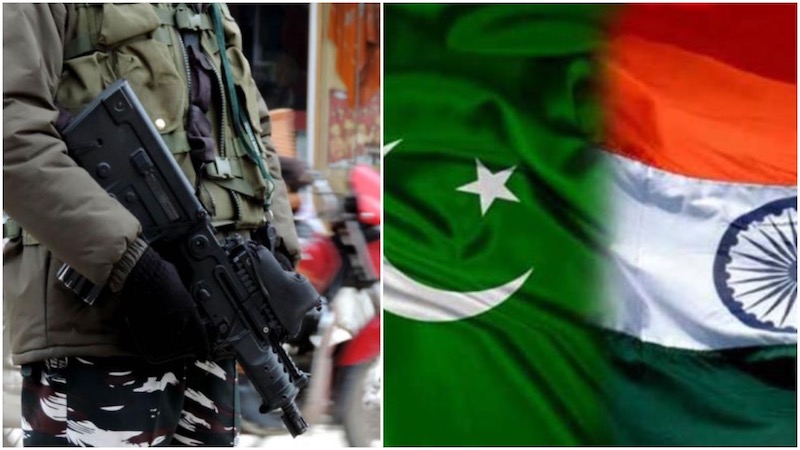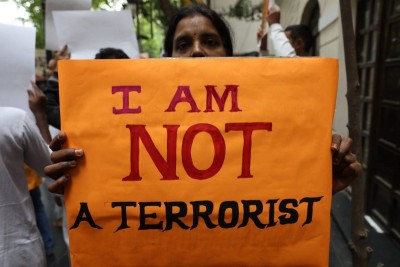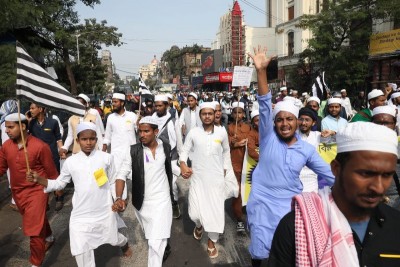
We have to think beyond Article 370 to take Kashmir forward, says JK youth leader Mir Junaid
Srinagar: As Jammu and Kashmir witnesses gradual withdrawal of the restrictions imposed to prevent violence and unrest in the aftermath of scrapping Article 370, a new breed of young leaders outside the Muftis and Abdullahs are stepping in to fill the socio-political void created by the events of the last few months.
One young Kashmir leader who is vocal about charting a way beyond Article 370- under which Jammu and Kashmir used to enjoy special status for many decades- is Mir Junaid.
"Everyone is trying to be a critic of the government. But we want to be a solution," says Mir Junaid speaking to IBNS.
"Because of the dominance of a few families we saw chaos, status quo and unrest. Let us come up with a roadmap instead of chaos, corruption and dynastic rule," he said.
The Modi government on Aug 5 scrapped Article 370 and 35A and bifurcated the terrorism-wracked Jammu and Kashmir into two Union Territories- Jammu and Kashmir with an assembly and a Buddhist-dominated Ladakh without an assembly.
Of the estimated 7 million people living in the Kashmir Valley, 97% are Muslims. Article 35A of the Indian Constitution had allowed the Jammu and Kashmir state's legislature to define “permanent residents” of the state and also provided special rights and privileges to those permanent residents.

Article 370 used to grant Jammu and Kashmir the right to have its own constitution and flag and had empowered it to handle its own laws except on matters that impact national security.
The cause of a simmering conflict between India and Pakistan since 1947 when both the countries gained Independence from the British rule, the Indian Kashmir saw the killing of over 40,000 people since 1989 as Pakistan- which also lays claim in the territory- continued to export terror to destabilise the region.
A magnet of tourists from across the world for its unsurpassed natural beauty, Kashmir's minority Hindus- known as the Kashmiri Pandits- had fled the region since 1989 when an era of terrorism began and violence unleashed on them forced their exodus.
An estimated 200,000 to 300,000 Hindus had to flee the region for their lives and many had since been living as refugees in their own country.
"Our plan is to take Jammu and Kashmir on the path of a new socio-economic-political movement. What has been done, cannot be undone. The only way is to move forward," Junaid said.
"We also have faith in judiciary regarding the petitions [filed challenging the abrogation of Article 370]," he said.
The Supreme Court has granted the Union government 28 days' time (from Oct 1) to reply to a clutch of petitions in the apex court challenging the historic move of scrapping Article 370 in Jammu and Kashmir.
"We have to accept the fact that Article 370 was not abrogated by you and me but by some 370 odd lawmakers in Indian Parliament," he said.
"We have to think beyond and we have identified our key goals of creating a green economy in Kashmir, a society of peace and educated people and a competitive economy with good infrastructure," he said.

The political leaders ruling us so far themselves kept on hollowing Article 370 and 35A. They had failed to protect our rights and now want to fight for the welfare of the people and restore their rights, he said.
According to Mir Junaid, they would fight for things that are legally justified.
"We will fight for those illegally detained [during the scrapping to Article 370]. We will talk about health and hygiene. We need top doctors and free treatment for the people of Kashmir," he said.
"There are thousands of terror victims in Kashmir but no one talks about them. Girls who are in their thirties are unmarried owing to the unrest. We will fight for them and for the weaker sections of the society," he said.
"You see the state of economy. The Jammu and Kashmir Bank is in shambles. In tourism we have to bring the model of Goa. There should be good governance and accountability," he said.
He said the new buzzwords of Kashmir should be tourism, technology, transport, water, work culture, education, environment, electricity.
"We agree that there is a political vacuum in the state now and the void should be filled. We now need to have leaders who understand the suffering of the common man," said Junaid even as New Delhi recently granted permission to political delegations of the National Conference (Omar Abdullah-Farooq Abdullah) and Peoples Democratic Party (PDF of Mehbooba Mufti) to meet their leaders held captive since early August.
Junaid said they would fight for statehood and it is good that the former political elites have been rendered powerless in Kashmir.
"Kashmir is known for its Kashmiriyat. It symbolises unity in diversity, but some people gave Kashmir a bad name. They used the state and its people for their political hunger," he said.
On the issue of stone-pelting by young boys and girls in Kashmir which earned notoriety and invoked action by the troopers who are usually at the receiving end of the ground situation, he said they (stone-pelters) should have to be counselled and explained so that they refrain from such activity.
"Kashmir wants to move forward . The common people of Kashmir are a hard-working lot. It has been more than 73 days now that Article 370 was scrapped and owing to the lockdown the state suffered a loss of over INR 60,000 crores," he said.
Junaid said along with restoring the mobile phone and landline services, Internet services should be restored too because without it the state cannot progress.
Junaid said they have faith in the security forces fighting in the border and the real fight is of ideas and thoughts and not of a fight with bullets. "Thoughts have to be fought with thoughts," he said.
Junaid said in a Kashmir of peace and unity, the Pandits- who had to flee the region in 1989-90 when they were targeted by the Islamist militants- should be brought back to the Valley to live without violence.
"We welcome our Pandit brothers and sisters. They should come back as our culture is our identity. The Kashmiri Pandits, the Sikhs and all should come back and play important roles," he said, adding that the Kashmir narrative should be changed.
"The youths should play a role and our image must change," he said.

Support Our Journalism
We cannot do without you.. your contribution supports unbiased journalism
IBNS is not driven by any ism- not wokeism, not racism, not skewed secularism, not hyper right-wing or left liberal ideals, nor by any hardline religious beliefs or hyper nationalism. We want to serve you good old objective news, as they are. We do not judge or preach. We let people decide for themselves. We only try to present factual and well-sourced news.







